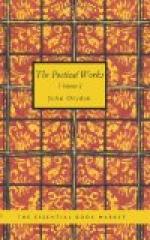So long they flew with inconsiderate
haste,
That now their afternoon began to waste;
And, what was ominous, that very morn
The sun was enter’d into Capricorn;
Which, by their bad astronomer’s
account,
That week the Virgin balance should remount.
600
An infant moon eclipsed him in his way,
And hid the small remainders of his day.
The crowd, amazed, pursued no certain
mark;
But birds met birds, and jostled in the
dark:
Few mind the public in a panic fright;
And fear increased the horror of the night.
Night came, but unattended with repose;
Alone she came, no sleep their eyes to
close:
Alone, and black she came; no friendly
stars arose.
What should they do, beset
with dangers round, 610
No neighbouring dorp,[126] no lodging
to be found,
But bleaky plains, and bare unhospitable
ground.
The latter brood, who just began to fly,
Sick-feather’d, and unpractised
in the sky,
For succour to their helpless mother call:
She spread her wings; some few beneath
them crawl;
She spread them wider yet, but could not
cover all.
To augment their woes, the winds began
to move,
Debate in air, for empty fields above,
Till Boreas got the skies, and pour’d
amain 620
His rattling hailstones mix’d with
snow and rain.
The joyless morning late arose,
and found
A dreadful desolation reign around—
Some buried in the snow, some frozen to
the ground.
The rest were struggling still with death,
and lay
The Crows’ and Ravens’ rights,
an undefended prey:
Excepting Martin’s race; for they
and he
Had gain’d the shelter of a hollow
tree:
But soon discover’d by a sturdy
clown,
He headed all the rabble of a town,
630
And finish’d them with bats, or
poll’d them down.
Martin himself was caught alive, and tried
For treasonous crimes, because the laws
provide
No Martin there in winter shall abide.
High on an oak, which never leaf shall
bear,
He breathed his last, exposed to open
air;
And there his corpse, unbless’d,
is hanging still,
To show the change of winds with his prophetic
bill.
The patience of the Hind did almost
fail;
For well she mark’d the malice of
the tale;[127] 640
Which ribald art their Church to Luther
owes;
In malice it began, by malice grows;
He sow’d the Serpent’s teeth,
an iron-harvest rose.
But most in Martin’s character and
fate,
She saw her slander’d sons, the
Panther’s hate,
The people’s rage, the persecuting
state:
Then said, I take the advice in friendly
part;
You clear your conscience, or at least
your heart:
Perhaps you fail’d in your foreseeing
skill,
For Swallows are unlucky birds to kill:




